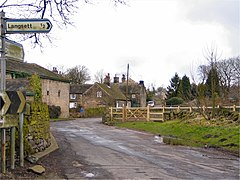Upper Midhope
| Upper Midhope | |
|---|---|
 Upper Midhope |
|
| Upper Midhope shown within Sheffield | |
| Metropolitan borough | |
| Metropolitan county | |
| Region | |
| Country | England |
| Sovereign state | United Kingdom |
| Post town | SHEFFIELD |
| Postcode district | S36 |
| Dialling code | 0114 |
| Police | South Yorkshire |
| Fire | South Yorkshire |
| Ambulance | Yorkshire |
| EU Parliament | Yorkshire and the Humber |
| UK Parliament |
|
Upper Midhope (archaic Over Midhope) is a village in the civil parish of Bradfield within the electoral ward in the borough of the City of Sheffield, England. It lies just on the edge of the Peak District national park.
Historical the habitation, together with Nether Midhope (Midhopestones), were collective known as Midhope.
Upper Midhope, formerly 'Over Midhope', is a village in northwest of civil parish of Bradfield, close to the village of Langsett, located at a local high point between Langsett Reservoir and Midhope Reservoir. Together with the village of Midhopestones (formerly Nether Midhope), the village forms the settlement referred to as Midhope (archaic Middop or Middup).
The Conservation Area Appraisal states that the hamlet dates to at least the medieval period, with records dating back to 1227 and archaeological evidence that goes back further. The village was a traditional rural settlement; its relatively high location led to sheep farming as the main economic activity, bee keeping was also practised. At the end of the 19th century land around Upper Midhope was acquired by Sheffield Corporation for the construction of reservoirs. A number of dwellings were lost during the construction of the Langsett Reservoir, as well as the original connecting road to Langsett. During the 20th century the village became increasingly used as a residential village; as of 2009 most of the village is now residential, including the use of former barns converted to dwellings.
The village was made a conservation area in 1977. There are a number of historic buildings, including four listed structures dating from the 17th or 18th centuries: Town Head Cottages, and three buildings with cruck frame constructions: Well Bank Farm, Manor Farmhouse, and a set of buildings at Well Bank Farmhouse/Sycamore Cottage.
...
Wikipedia

